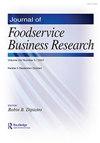What motives U.S. restaurant customers to choose plant-based meat alternative dishes?
Q2 Agricultural and Biological Sciences
引用次数: 0
Abstract
ABSTRACTThe purpose of this study is to examine how different consumption values influence consumer intentions to choose a dish featuring plant-based meat alternatives at a restaurant by applying the theory of consumption values. The present study also investigates the mediating role of attitude in the relationships between values and consumer intentions. Responses were collected through the Qualtrics panel service and structural equation modeling was employed to analyze the data. The results, based on a total of 682 usable panel responses, indicate that emotional and epistemic values acted as significant driving forces, directly promoting consumers’ intention. Attitude was aroused by distinctive, functional, emotional, and conditional values and in turn, significantly impacted intention. Furthermore, it was found that attitude fully mediated the relationship between conditional value and intention. The results offer useful implications for restaurants that offer menus with plant-based meat alternatives.KEYWORDS: Plant-based meat alternativestheory of consumption valueconsumer behavioral intentionrestaurant consumer attitude Disclosure statementNo potential conflict of interest was reported by the author(s).美国餐馆顾客选择植物性肉类替代菜肴的动机是什么?
摘要本研究旨在运用消费价值理论,探讨不同的消费价值观如何影响消费者在餐厅选择植物性肉类替代品的意愿。本研究还探讨了态度在价值观与消费者意向关系中的中介作用。通过Qualtrics面板服务收集反馈,并采用结构方程模型对数据进行分析。基于682个可用的面板回答的结果表明,情感和认知价值是重要的驱动力,直接促进了消费者的意愿。态度被独特价值、功能价值、情感价值和条件价值所激发,进而显著影响意向。此外,态度在条件价值与意向的关系中起完全中介作用。研究结果为那些提供植物性肉类替代品的餐馆提供了有用的启示。关键词:植物性肉类替代品;消费价值理论;消费者行为意向;餐馆消费者态度;
本文章由计算机程序翻译,如有差异,请以英文原文为准。
求助全文
约1分钟内获得全文
求助全文
来源期刊

Journal of Foodservice Business Research
Agricultural and Biological Sciences-Food Science
CiteScore
4.40
自引率
0.00%
发文量
52
期刊介绍:
The Journal of Forecasting is an international journal that publishes refereed papers on forecasting. It is multidisciplinary, welcoming papers dealing with any aspect of forecasting: theoretical, practical, computational and methodological. A broad interpretation of the topic is taken with approaches from various subject areas, such as statistics, economics, psychology, systems engineering and social sciences, all encouraged. Furthermore, the Journal welcomes a wide diversity of applications in such fields as business, government, technology and the environment.
 求助内容:
求助内容: 应助结果提醒方式:
应助结果提醒方式:


